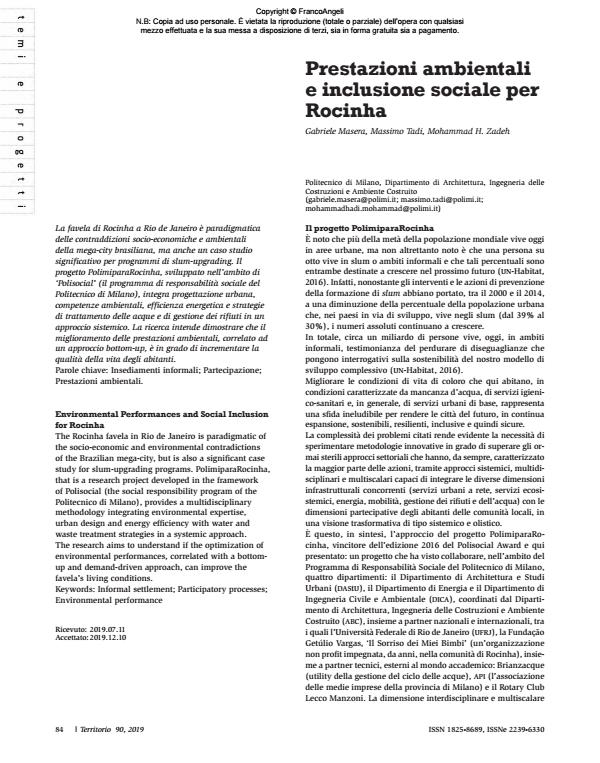Environmental Performances and Social Inclusion for Rocinha
Journal title TERRITORIO
Author/s Gabriele Masera, Massimo Tadi, Mohammad H. Zadeh
Publishing Year 2020 Issue 2019/90 Language Italian
Pages 10 P. 84-93 File size 503 KB
DOI 10.3280/TR2019-090010
DOI is like a bar code for intellectual property: to have more infomation
click here
Below, you can see the article first page
If you want to buy this article in PDF format, you can do it, following the instructions to buy download credits

FrancoAngeli is member of Publishers International Linking Association, Inc (PILA), a not-for-profit association which run the CrossRef service enabling links to and from online scholarly content.
The Rocinha favela in Rio de Janeiro is paradigmatic of the socio-economic and environmental contradictions of the Brazilian mega-city, but is also a significant case study for slum-upgrading programs. PolimiparaRocinha, that is a research project developed in the framework of Polisocial (the social responsibility program of the Politecnico di Milano), provides a multidisciplinary methodology integrating environmental expertise, urban design and energy efficiency with water and waste treatment strategies in a systemic approach. The research aims to understand if the optimization of environmental performances, correlated with a bottomup and demand-driven approach, can improve the favela’s living conditions.
Keywords: Informal settlement; Participatory processes; Environmental performance
- Pearlman J., 2010, Favela: Four decades of living on the edge in Rio de Janeiro. Oxford: Oxford University Press.
- Rekow L., 2016, ≪On Unstable Ground: Issues Involved in Greening Space
- Arcidiacono A., Causone F., Grosso M., Masera G., Tadi M., Zadeh H.M., 2017, ≪Environmental Performance and Social Inclusion: A Project for the Rocinha Favela in Rio de Janeiro≫. Energy Procedia, 134: 356-365.
- Arcidiacono A., Becciu G., Causone F., Colucci A., Grosso M., Masera G., Mambretti S., Zadeh H., Tadi M., 2018, Compendium of Inspiring Practices:
- Health Edition. International Guidelines on Urban and Territorial Planning. un-Habitat,United Nations Human Settlements Programme. Nairobi: unon, Publishing Services Section.
- Atuesta L., Soares Y., 2016, ≪Urban Upgrading in Rio de Janeiro: Evidence from the Favela-Bairro Programme≫. Urban Studies, 55: 1–18. DOI: 10.1177/0042098016669290
- Balloussier A.V., 2017, ≪Residents of the Rocinha Slum in Rio Express Distrust of Military Presence≫. Folha de S.Paulo, Sept. 25th. -- www1.folha.uol.com.br/internacional/en/brazil/2017/09/1921531-residentsof-the-rocinha-slum-in-rio-de-janeiro-are-weary-of-military-presence. shtml (accessed on: 2020.01.10).
- Batty M., 1976, Urban modelling: algorithms, calibration, predictions. Cambridge: Cambridge University Press.
- Burgos M., 2016, Development, Security and Displacement: An Ethnographic Case Study of Rocinha and other Key Favelas in Rio de Janeiro. CUNY: Academic Works.
- Cardoso A.L., Rossi A.M.G., 2010, ≪Experiences with the Urbanisation of Slums: Management and Intervention Models≫. In: Pina Filho A.C., Pina A.C. (eds.), Methods and Techniques in Urban Engineering. Croatia: In-Tech.
- Habib E., 2009, ≪The role of government and NGOs in slum development: the case of Dhaka City≫. Development in Practice, 19: 259 265. DOI: 10.1080/09614520802689576
- Hwang S.W., 1996, ≪The implications of the nonlinear paradigm for integrated Environmental Design and Planning≫. Journal of Planning Literature, 11, 2: 167–180. DOI: 10.1177/088541229601100202
- Lima Neto N.F., 2015, As recentes intervenções urbanas na Rocinha e a participação dos moradores nesse processo: a experiência do grupo Rocinha Sem Fronteiras. Master Thesis. Pontificia Universidade Catolica do Rio de Janeiro.
- Mahabir R., Crooks A., Croitoru A., Agouris P., 2016, ≪The study of slums as social and physical constructs: challenges and emerging research opportunities≫. Regional Studies, Regional Science, 3: 399-419. DOI: 10.1080/21681376.2016.1229130
- McFarlane C., 2012. ≪Rethinking informality: politics, crisis and the city≫. Planning Theory and Practice, 13: 88-108. DOI: 10.1080/14649357.2012.649951.
- in the Rocinha Favela of Rio De Janeiro≫. Journal of Human Security, 12, 1: 52-73.
- Rekow L. 2016, ≪Pacification and Mega-Events in Rio de Janeiro: Urbanisation, Public Security, & Accumulation by Dispossesion ≫. Journal of Human Security, 12, 1: 4-34.
- Riley E., Fiori J., Ramirez R., 2001, ≪Favela Bairro and a new generation of housing programmes for the urban poor≫. Geoforum, 32, 4: 521–531.
- Roller Z., 2011, ≪pac Growth Acceleration Program Hits the Brakes in Rocinha≫. RioOnWatch, 8 September. -- www.rioonwatch.org/?p=1705(ultimo accesso: 06.12.2019).
- Tadi, M., Vahabzadeh Manesh S., 2014, ≪Transformation of an urban complex system into a more sustainable form via integrated modification methodology (i.m.m)≫. The International Journal of Sustainable Development and Planning, 9, 4: 514-537. Southampton, uk: wit press.
- un-Habitat, 2012, ≪Housing & slum upgrading≫. -- https://unhabitat.org/urban-themes/housing-slum-upgrading/ (ultimo accesso: 2018.09.15).
- un-Habitat, 2016, ≪World Cities Report 2016: Urbanization and Development – Emerging Futures≫. United Nations Human Settlements Programme. -- https://unhabitat.org/books/world-cities-report/ (ultimo accesso: 2020.01.10).
- un-Habitat, 2016, ≪Slum Almanac 2015/2016: Tracking Improvement in the Lives of Slum Dwellers≫. United Nations Human Settlements Programme. -- https://unhabitat.org/wp-content/uploads/2016/02-old/Slum%20Almanac%202015-2016_EN.pdf (ultimo accesso: 2018.09.15).
Gabriele Masera, Massimo Tadi, Mohammad H. Zadeh, Prestazioni ambientali e inclusione sociale per Rocinha in "TERRITORIO" 90/2019, pp 84-93, DOI: 10.3280/TR2019-090010